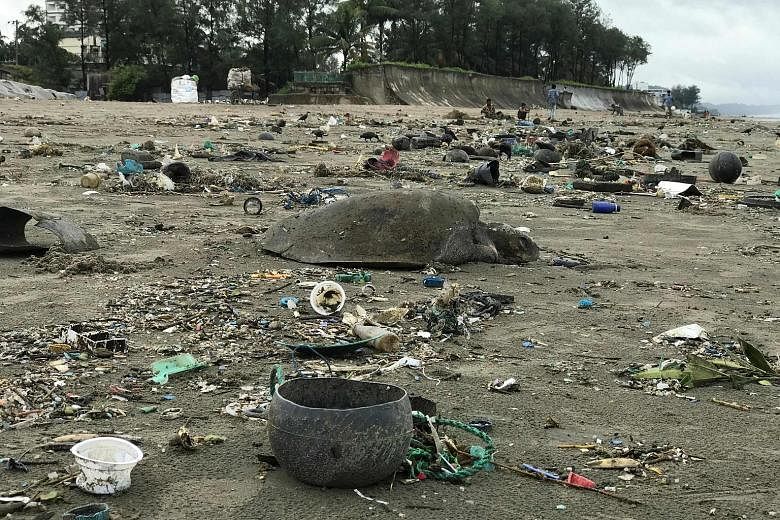The amount of plastic waste flowing into the ocean and killing marine life could triple in the next 20 years, unless companies and governments can drastically reduce plastic production, according to a new study.
Single-use plastic consumption has increased during the coronavirus pandemic, says the International Solid Waste Association, a non-governmental organisation. Face masks and latex gloves are washing up daily on Asia's remote beaches.
Landfills worldwide are piled high with record amounts of takeaway food containers and online delivery packaging.
The new research, carried out by scientists and industry experts for The Pew Charitable Trusts and Systemiq, also offers solutions that could cut the projected volume of plastic entering the ocean by more than 80 per cent.
The road map for stemming the runaway ocean plastic waste crisis is among the most detailed ever offered in a study.
If no action is taken, however, the amount of plastic going into the sea every year will rise from 11 million tonnes to 29 million tonnes, leaving a cumulative 600 million tonnes swilling in the ocean by 2040, the equivalent weight of three million blue whales, according to the study published in the journal Science.
"Plastic pollution is something that affects everyone. It isn't a 'your problem and not my problem'. It's not one country's problem. It's everyone's problem," said the study's co-author Winnie Lau, a senior manager at Pew. "It's going to get worse if we don't do anything."
The strategy laid out in the report includes redirecting hundreds of billions of dollars in plastic production investment into alternative materials, recycling facilities and waste collection expansion in developing countries.
This would require a U-turn by the energy industry, which is rapidly building new chemical plants around the world to boost plastic output as its traditional fuel business is eroded by a rise in cleaner energy sources.
In 2017, the amount of plastic produced annually was 348 million tonnes, and this is expected to double by 2040, the study estimates.
Big plastic producers, including ExxonMobil, Dow and Chevron Phillips Chemical, have said they are committed to tackling plastic pollution, despite increasing their output. The projects they fund focus on cleaning up waste.
The paper recommends, however, that governments implement laws to discourage new plastic production and provide subsidies for reusable alternatives.
The plastic industry, however, has lobbied against government bans on single-use plastic.
Some of the biggest buyers of plastic are consumer goods companies such as Coca-Cola, PepsiCo, Nestle and Unilever.
REUTERS

